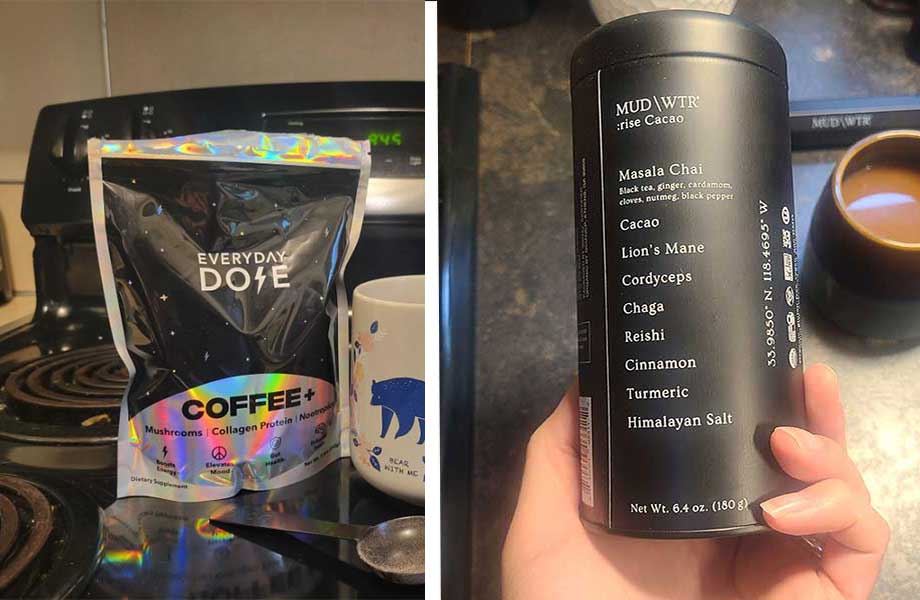We test and review fitness products based on an independent, multi-point methodology. If you use our links to purchase something, we may earn a commission. Read our disclosures.
If you’re looking for extra ways to optimize your wellness routine after mastering the basics like exercising regularly, eating well, and getting enough sleep, you may be looking into things like mindfulness techniques, the best ashwagandha supplements, and coffee alternatives.
Mushroom coffees have exploded in popularity as people look for ways to avoid caffeine jitters, manage stress, improve focus, and boost gut health without completely giving up their morning cup of coffee or tea.
Everyday Dose and MUD\WTR are two popular brands of mushroom coffee that are similar in many ways, but have some important differences. We’ll compare and contrast Everyday Dose vs MUD WTR in this article, combining real-life testing results from our fitness experts with insights from myself, a registered dietitian, on their ingredients and effectiveness to help you choose the best product for your needs.
Everyday Dose
Everyday Dose Mushroom Coffee Starter Kit
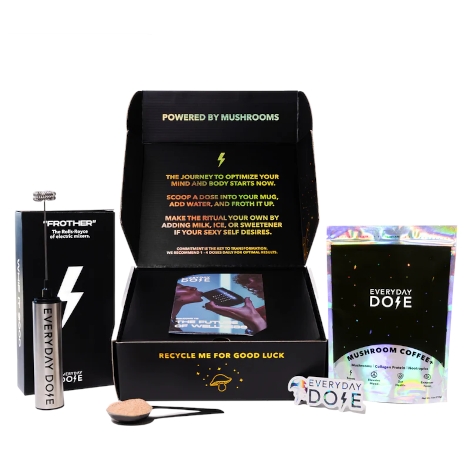
Product Highlights
- Combination of coffee, mushrooms, collagen protein, and nootropics
- Listed benefits: Improve energy, mood, focus, memory, sleep, immunity, and gut health while reducing stress
- Dairy-, soy-, sugar-, and gluten-free
- Included: 30 servings mushroom coffee, rechargeable frother, gunmetal dose spoon, breathwork app by Othership, and wellness booklet
Pros & Cons
Pros
- Combines coffee, mushrooms, collagen, and nootropics
- No GMOs, herbicides, pesticides, artificial colors, flavors, preservatives, or sweeteners
- Keto- and paleo-friendly
Cons
- Only 2 mushrooms in the blend
- Not vegan due to collagen
- Only available in the United States
Bottom Line
Everyday Dose is a coffee alternative that combines a two-mushroom blend and coffee. One serving contains 45 milligrams of caffeine. Customer reviews for this were generally positive. Many consumers found this product helpful in reducing their coffee and caffeine consumption.
Product not found.
Medical disclaimer: This article is intended for educational and informational purposes only. It is not intended as a substitute for medical advice. For health advice, contact a licensed healthcare provider. GGR also recommends choosing a product that has been third-party tested for quality.
Everyday Dose vs MUD WTR Comparison Chart
| MUD\WTR | Everyday Dose | |
| Price | $50.00 per package / 30 servings = $1.67 per serving without a subscription; $1.33 per serving with a subscription | $45.00 per package / 30 servings = $1.50 per serving without a subscription; $1.20 per serving with a subscription |
| Type of mushroom | Lion’s Mane, Cordyceps, Chaga, Reishi | Lion’s Mane, Chaga |
| Amount of mushrooms | 2,240 mg | Not labeled |
| Other notable ingredients | Cacao, Cinnamon, Turmeric, Himalayan Pink Salt | Coffee Extract, Collagen Protein, L-Theanine |
| Flavors | Original (Masala Chai), Matcha (Matcha Chai), Gold (Turmeric), Rest (Rooibos Chai) | Coffee+, Matcha+ |
| Caffeine content | 0, 35, or 55 mg (depending on flavor) | 40 mg (Matcha+), 45 mg (Coffee+) |
| Extras | Free rechargeable frother when you sign up for a subscription | Free rechargeable frother, Gunmetal Dose spoon, Breathwork app access, and Wellness Booklet when you sign up for a subscription |
| Packaging | Recyclable, reusable metal tin | Resealable bag |
Quick Look: Everyday Dose vs MUD WTR
When comparing these shroomy coffees, it’s important to consider factors like mushroom varieties and amounts, caffeine sources, and whether the product contains additional health-promoting ingredients. We also checked for the presence of sweeteners, artificial ingredients, and food additives.
Below are some helpful highlights. For more detailed information, check out our full MUD WTR Review.
Who Should Buy Everyday Dose
- Those who want the joint health benefits of hydrolyzed collagen peptides
- People on a tighter budget
- Those who want the smoothest consistency with no settling
- Customers who want to improve focus with L-theanine
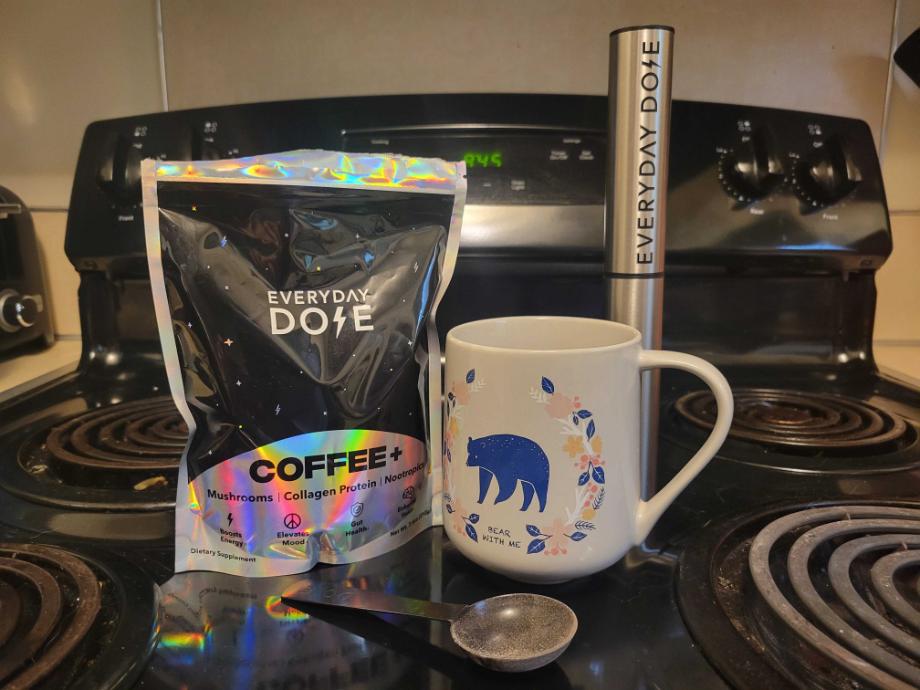
Who Should Buy MUD WTR
- People who want a larger variety of mushrooms
- Vegans and vegetarians
- Those who prefer whole powdered mushrooms over mushroom extracts
- Anyone wanting a certified USDA Organic option
- Those who enjoy the flavor and anti-inflammatory benefits of chai spices

Key Similarities Between Everyday Dose and MUD WTR
- Contain less caffeine than a cup of coffee
- Matcha-based options available
- Contain proprietary mushroom blends
- Each contains lion’s mane and chaga mushrooms
- Coconut creamers sold separately
- Can be prepared with cold or hot water
Important Differences Between Everyday Dose and MUD WTR
- Everyday Dose contains 2 types of mushrooms, while MUD\WTR contains 4
- Everyday Dose is made with mushroom and coffee extracts, while MUD/WTR is made with whole powdered mushrooms and tea
- Everyday Dose contains collagen and L-theanine
- MUD\WTR has caffeine-free options
RELATED: Onnit Shroom Tech Review
Formulation
Everyday Dose and MUD\WTR both contain a blend of adaptogenic mushrooms free from sweeteners, GMOs, gluten, artificial ingredients, and food additives and contain about half the amount of caffeine you’d get in a traditional cup of coffee.
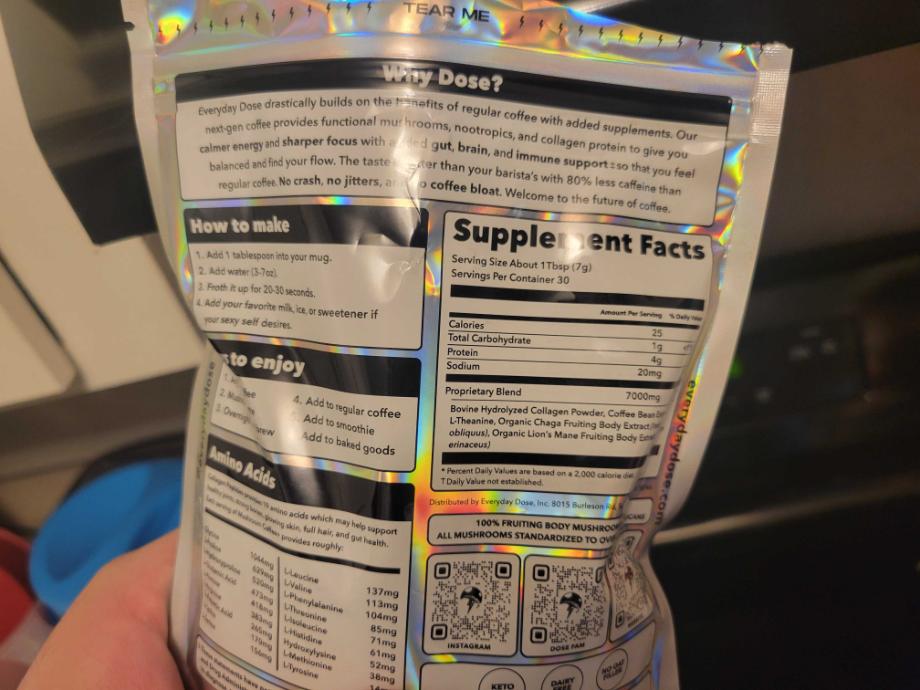
While similar, they do vary in significant ways. In addition to chaga and lion’s mane mushrooms, Everyday Dose contains hydrolyzed bovine collagen peptides for improved skin, hair, and joint health. It also contains the amino acid L-theanine, which, according to a 2010 randomized controlled trial1, may help improve focus during demanding cognitive tasks when combined with caffeine.
Because Everyday Dose only contains two different types of functional mushrooms and combines them with coffee bean extract and L-theanine in a vague proprietary blend, we could only give the formulation a 2-out-of-5-star rating. The actual amounts of these ingredients aren’t disclosed, so we don’t know whether the dosages are effective.
For example, the study above tested 97 milligrams of L-theanine with 40 milligrams of caffeine and found that this combination was effective for improving focus, but the amount of L-theanine in Coffee+ isn’t listed on the label. Matcha+ is an exception, with 120 milligrams of L-theanine listed on the label.
It’s worth noting that the optimal dose of lion’s mane (and other medicinal mushrooms) hasn’t yet been determined2, so claims about its benefits in any specific amount should be taken with a grain of salt.
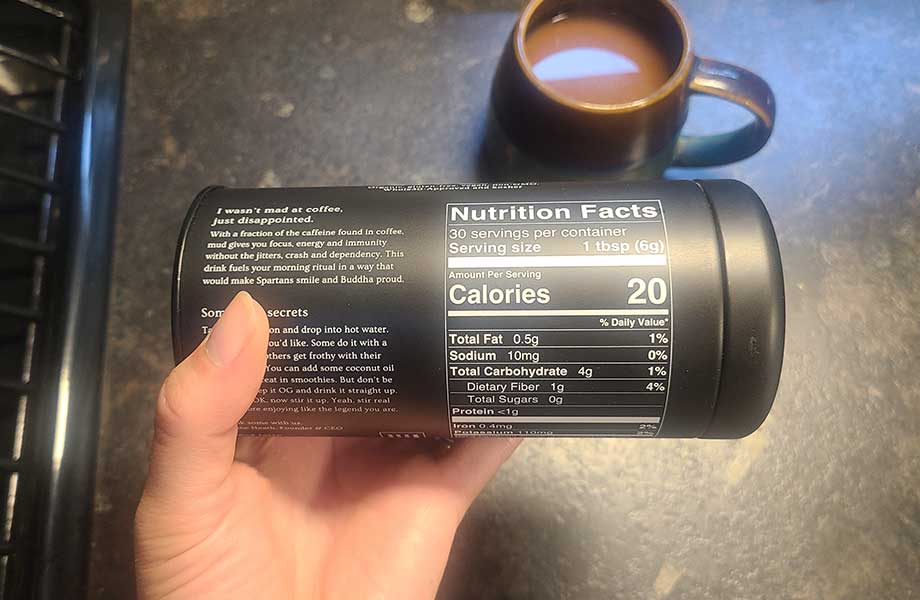
Also of note: Everyday Dose uses mushroom extracts and coffee extract rather than whole powdered mushrooms or coffee beans, which may be a dealbreaker for some people.
MUD\WTR received a slightly higher 3-out-of-5-star rating for formulation thanks to the fact that it contains four varieties of mushrooms, organic ingredients, and antioxidant-rich black tea and chai spices. It also contains whole powdered mushrooms. That said, it contains a proprietary blend and would have scored higher if the amounts of each individual ingredient were more transparent.
RELATED: How to Make Protein Coffee
Taste and Solubility
We looked to our expert product testers for their real-life experiences with these mushroom coffees. Caine Wilkes, an Olympian and USAW-L1 weightlifting coach, tested Everyday Dose for us. MUD\WTR was tested by Frieda Johnson, certified nutrition coach and specialist in exercise therapy.
In terms of flavor, Everyday Dose had a slight edge. Caine rated the Coffee+ a 4 out of 5, saying that it “tasted somewhat like weak instant coffee. It’s not too earthy, and it tasted great when mixed with my regular coffee. I wouldn’t replace my normal coffee or tea with it, but a lot of customers online love the flavor.”
Frieda had similar comments about MUD\WTR. “I tried the Original flavor, which tasted like watered-down chai with a little bit of cocoa. It’s good, but needs some doctoring to make it delicious,” she said, rating the flavor a 3.75 out of 5.
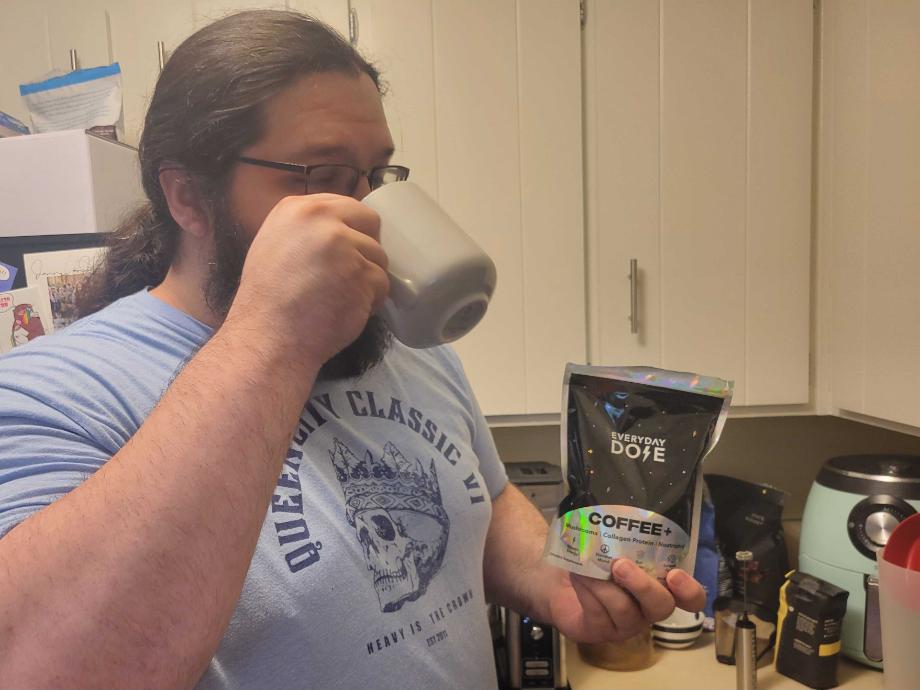
Everyday Dose also shone for its solubility, with Caine noting, “It mixes smoothly thanks to the frother that comes with your first purchase. There was no settling and the frother gave it an airy, whipped texture, which was really pleasant.” It got top marks here with a 5 out of 5 rating.
Meanwhile, MUD\WTR got a disappointing 2 out of 5 rating from Frieda. “It settles a lot at the bottom of the glass. I had to stir it back up as I drank it. If you don’t, you’ll have to add more water at the end so you can finish drinking it. I also found it a bit gritty, even with the stirring,” she said.
Neither of our testers noted any unpleasant side effects.
RELATED: Coffee vs Pre-Workout
Price Per Serving
While pricing for both brands varies based on whether you choose the subscription starter kit, Everyday Dose wins out for affordability. At $1.20 per serving with a subscription and a discount for the first month at $0.90 a serving, it earned a 5 out of 5 rating for price. Without a subscription, a one-time purchase will run you $1.50 per serving.
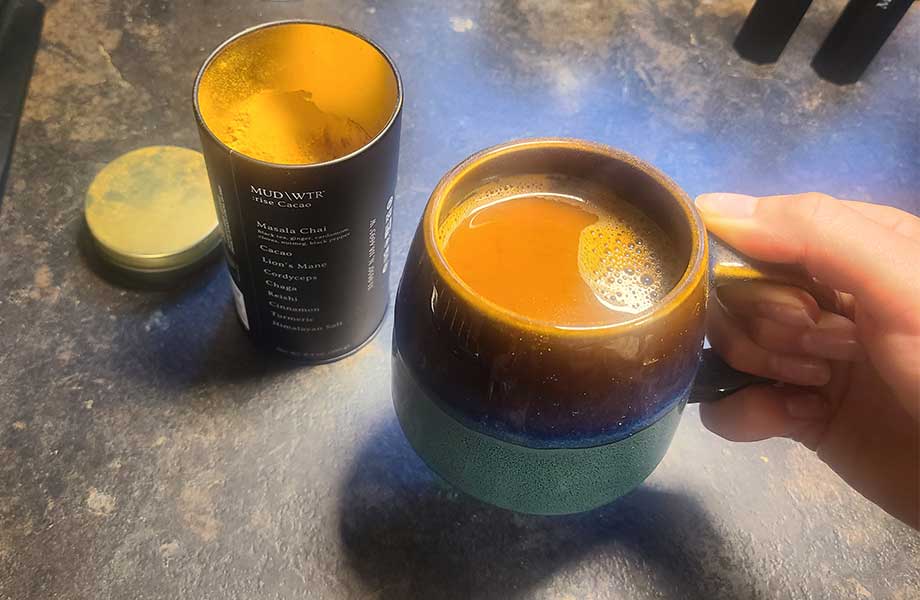
MUD\WTR costs a bit more, likely due in part to its higher-quality formulation. At subscription pricing of $1.33 per serving or $1.67 per serving for a one-time purchase, it earned a 3 out of 5 from us.
Company Policies
Honestly, we found the refund policy from Everyday Dose to be a bit confusing overall.
They offer free shipping on subscription orders and will refund first-time orders if you email customer service within 45 days of delivery. Unfortunately, their money-back guarantee only applies to subscription orders, not one-time purchases, and they only refund opened packages from first-time orders. You’ll also have to email them the tracking information for your return.
MUD\WTR earned a 4 out 5 from us for their customer-friendly policies, offering refundable first-time orders within 30 days of purchase. You’ll just need to use the contact form on their website to submit your refund request. They also offer a referral discount program to reward customers who recommend it to others.
Everyday Dose vs MUD WTR: Final Thoughts
If you’re simply looking for a lower-caffeine alternative to coffee, Everyday Dose and MUD\WTR will both do the trick. Coffee lovers may be disappointed by the comparatively watered-down taste of both, but neither is unpleasant.
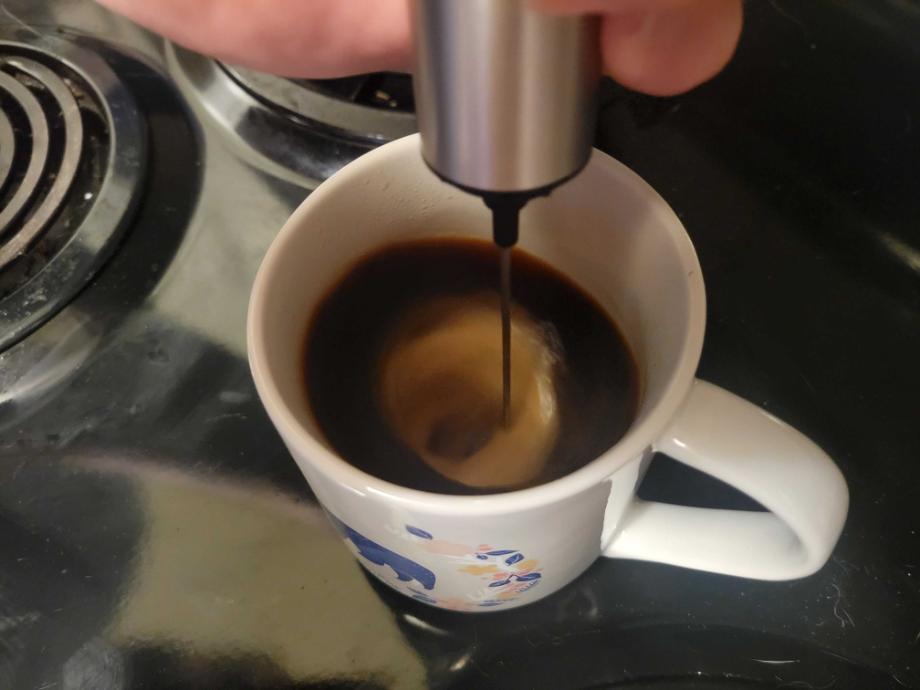
Both contain adaptogenic mushrooms which may help boost mental focus, improve the quality of your sleep, support immune function, and help the body adapt to stressful environments, although more research is needed before we can say for sure.
You may prefer Everyday Dose if you want collagen and L-theanine in your mushroom coffee, if you need to save money, or if you want the smoothest possible consistency. On the other hand, some may prefer MUD\WTR for its mushroom variety, chai spices, organic ingredients, use of whole powdered mushrooms, and caffeine-free options.
Still not sure if either of these are right for you? Check out our RYZE Mushroom Coffee Review for insights on an additional mushroom coffee brand.
Everyday Dose vs MUD WTR: FAQs
What’s the difference between Everyday Dose and MUD WTR?
Everyday Dose mushroom coffee contains two varieties of mushrooms, is made from mushroom and coffee extracts, contains collagen and L-theanine, and isn’t available in caffeine-free flavors.
MUD\WTR contains four mushroom varieties, contains organic ingredients, is made from black tea or matcha with chai spices, is made from whole powdered mushrooms, and comes in multiple caffeine-free flavors.
Is MUD WTR actually healthy?
It’s hard to say whether MUD\WTR can deliver on its purported health benefits since it contains a proprietary blend of ingredients, but it’s an effective way to cut down on your caffeine intake when used in place of a regular cup of coffee or latte. With cacao, chai spices, and black tea or matcha, it’s rich in antioxidants which can help fight oxidative stress in the body.
RELATED: Best Turmeric Supplement
While preliminary research suggests some potential health benefits of adaptogenic mushrooms, high-quality research in humans is still limited. More research is needed on the optimal dosages and varieties of mushrooms for benefits such as improved focus, stress reduction, immune support, and gut health.
Is MUD WTR the best mushroom coffee?
It’s hard to determine which mushroom coffee is best for everyone, as different people have different needs and preferences. MUD\WTR is made from high-quality, organic ingredients, but tastes a bit watered-down and doesn’t clearly label the amounts of each ingredient. However, it’s made from whole powdered mushrooms rather than extracts and caffeine-free options are available.
These statements have not been evaluated by the Food and Drug Administration. This product is not intended to diagnose, treat, cure, or prevent any diseases.
References
- Giesbrecht T, Rycroft JA, Rowson MJ, De Bruin EA. The combination of L-theanine and caffeine improves cognitive performance and increases subjective alertness. Nutr Neurosci. 2010;13(6):283-290. doi:10.1179/147683010X12611460764840
- Venturella G, Ferraro V, Cirlincione F, Gargano ML. Medicinal Mushrooms: Bioactive Compounds, Use, and Clinical Trials. Int J Mol Sci. 2021;22(2):634. Published 2021 Jan 10. doi:10.3390/ijms22020634
Further reading

For those with compact home gyms or just trying to save space, we present our picks for the best folding squat racks. Read more

Find the best Horizon Fitness EX-59 Elliptical reviews, courtesy of GGR. Read more

Looking for a nutrition app to level up your fitness journey? Here are our top picks for the 8 best calorie counter apps. Read more

Pre-workout is common among athletes determined to push their workout to the next level. However, there are pre-workout side effects you should know about. Read more

